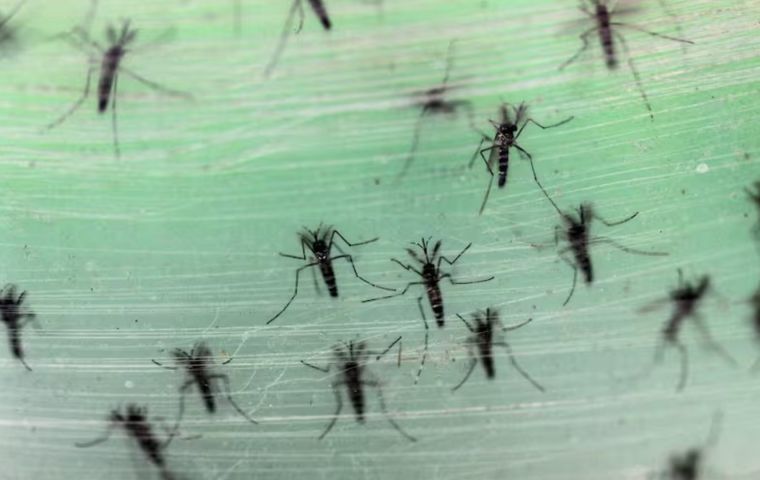MercoPress. South Atlantic News Agency
Dengue fever causes over 2,000 deaths so far this year in Brazil
 Federal health authorities will be deploying a biotechnological tactic to disarm the Aedes Aegypti mosquito
Federal health authorities will be deploying a biotechnological tactic to disarm the Aedes Aegypti mosquito Dengue fever has killed over 2,000 people in Brazil while almost 4.2 million cases of the malady have been confirmed this year in South America's largest country. The incidence rate of the disease is 2,056.9 cases per 100,000 inhabitants.
According to federal health authorities, some 2,073 deaths have been added to dengue's tab, while 2,291 other victims are still under investigation. The new figures represent an all-time high for Brazil, the Health Ministry reckoned while urging people not to lower their guard even though the worst part of dengue infections is believed to be behind. In all of 2023, only 1,094 deaths were recorded due to dengue in what had been the year with the most fatalities.
“We still have to pay attention. We have climbed the mountain, now we are descending, but we still have many cases that can occur and deaths that can be avoided,” warned the Sanitary and Environmental Surveillance Secretary Ethel Maciel.
Six Brazilian municipalities are to receive shortly the first batch of Aedes Aegypti mosquitoes infected with the wolbachia bacteria, a kind of Trojan horse to decimate the community of infected insects with viral load, it was reported. The strategy is expected to be extended next year to another 22 municipalities in the state of Minas Gerais.
The districts to receive the man-treated mosquitoes are Uberlândia Minas Gerais); Londrina and Foz do Iguaçu (Paraná); Presidente Prudente (São Paulo); Joinville (Santa Catarina); and Natal (Rio Grande do Norte).
According to Brazil's Health Ministry, The South American country is the first to incorporate biotechnology as a public strategy to reduce dengue cases in the medium and long term. The so-called Wolbachia method consists of inserting a bacterium into mosquito eggs in the laboratory and breeding Aedes aegypti carrying the microorganism. The infected insects are unable to carry the viruses that cause dengue, Zika, chikungunya, or yellow fever, but, inoculated with Wolbachia, when they reproduce they transmit the bacteria to others, preventing them from transmitting the disease to more humans.
The age groups most affected are 20 to 29 years old, 30 to 39 years old, and 40 to 49 years old, while the least affected are children under one-year-old, followed by people aged 80 years and over. Women have a higher rate of infection, with 55.1% compared to 44.9% of men.
The most affected regions are the Federal District (Brasília), Minas Gerais, Paraná, Espírito Santo, Goiás, Santa Catarina and São Paulo. Right behind these is Rio de Janeiro.




Top Comments
Disclaimer & comment rulesCommenting for this story is now closed.
If you have a Facebook account, become a fan and comment on our Facebook Page!